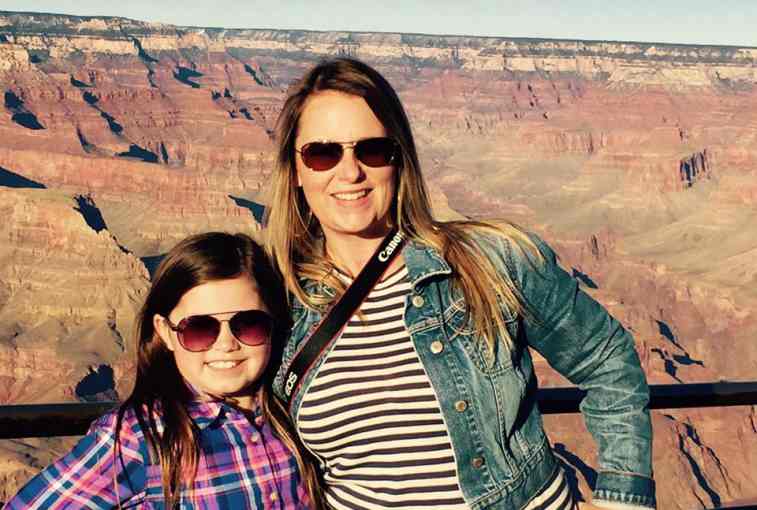Danyell Skillman already did breast self-examinations and annual mammograms when an email invitation from Sanford Health led her to take part in a project called the Wisdom Study. It revealed something unexpected: She’s at a higher risk of breast cancer because of her genes.
“I got the Wisdom Study email and thought, ‘Why would I not do that. I don’t have anyone in my family who’s had breast cancer, so I’m sure I don’t have a risk to develop it,” the 44-year-old mother of two said of her mom, five aunts, 26 cousins and two grandmothers who died at 87 and 93.
“They sent me the kit and I got a call a few weeks later saying I tested positive for one of the gene mutations.”
The news came as a shock.
Results from her saliva test didn’t say she would develop cancer, just that she has a better-than-normal chance because of the presence of that mutation.
American women, on average, have a 12 percent chance of developing breast cancer in their lifetimes. Skillman has a 20 to 40 percent chance.
The results led to conversations with her Sanford Health doctor, a genetic counselor and an Edith Sanford Breast Center breast health specialist to go over her options.
For now, she plans to faithfully continue self-exams and annual mammograms. Down the road, she may consider a double mastectomy with breast reconstruction.
“I’ve thought about it. I have two friends who have done it. I’m not opposed to doing it. I’m not ready to do it, but someday I might be. That almost eliminates my chances of developing it,” Skillman said.
‘Don’t freak out’
After getting the phone call with her results, Skillman immediately shared the news with family and friends, some of whom have also signed up for the Wisdom Study.
“I’m on a group text with my mom and her three sisters. At first I called my mom and said ‘don’t freak out’ and called my husband and said the same thing. Then I texted my aunts and told them,” she said.
Her mom and one of her aunts signed up because they’re also Sanford Health patients. Skillman’s aunt also was chosen for the saliva test, which showed that she also had the gene mutation.
“That confirmed that it came from my mom’s side,” said Skillman, who is in the process of referring her mother and other aunts to participate in the saliva test.
Wisdom Study details
The Wisdom Study’s goal is to determine if more a personalized approach to breast cancer screening leads to better outcomes and less confusion.
Sanford Health and five University of California medical centers teamed up as members of the Athena Breast Health Network for the study, which began Nov. 1, 2017, and will last five years.
As part of it, the Edith Sanford Breast Center randomly places participants in one of two screening channels — traditional annual screening and risk-based screening. Women who are part of the study must be 40-74 years old, have no history of breast cancer or ductal carcinoma in situ (DCIS), receive care in California or at Sanford Health and have not had a mastectomy.
The study aims to discover the best course of action to catch breast cancer early, avoid false alarms and unnecessary biopsies for women, and end some of the confusion with breast cancer screening guidelines.
Most advances in prevention, diagnosis and treatment of the disease have come from studies like this.
“With so many recommendations for breast cancer screening out there, it can be difficult to know what’s right for patients,” Dr. Allison Suttle, Sanford Health chief medical officer and OB/GYN said when it was announced. “This study is another way to gather information for women to use when they make decisions about their care and for our physicians to use when suggesting a screening plan.”
Knowledge is power
As if to affirm the credibility of the results, the gene mutation Skillman has also suggested a higher chance of thyroid cancer, which she was treated for when she was 21.
She doesn’t worry about the breast cancer chance but views the Wisdom Study as an added tool she can use in staying healthy.
“I’ve really done my research and understand what my options are. I have a 10-year-old daughter, and, for me, knowledge is power,” said Skillman, who also has an 8-year-old son. “So if I have the knowledge to prevent something or address if it becomes an issue, I would rather know than not know.
“Honestly, it becomes less about me and more about my family or more about my kids and wanting to watch them live a long, healthy life. I want to be here so I can watch them grow up.”
Learn more
- What to know about genetic tests predicting breast cancer
- Breast cancer: What you need to know
- The role of genetics in breast and ovarian cancer
…
Posted In Cancer, Cancer Screenings, Health Information, Imaging, Women's
